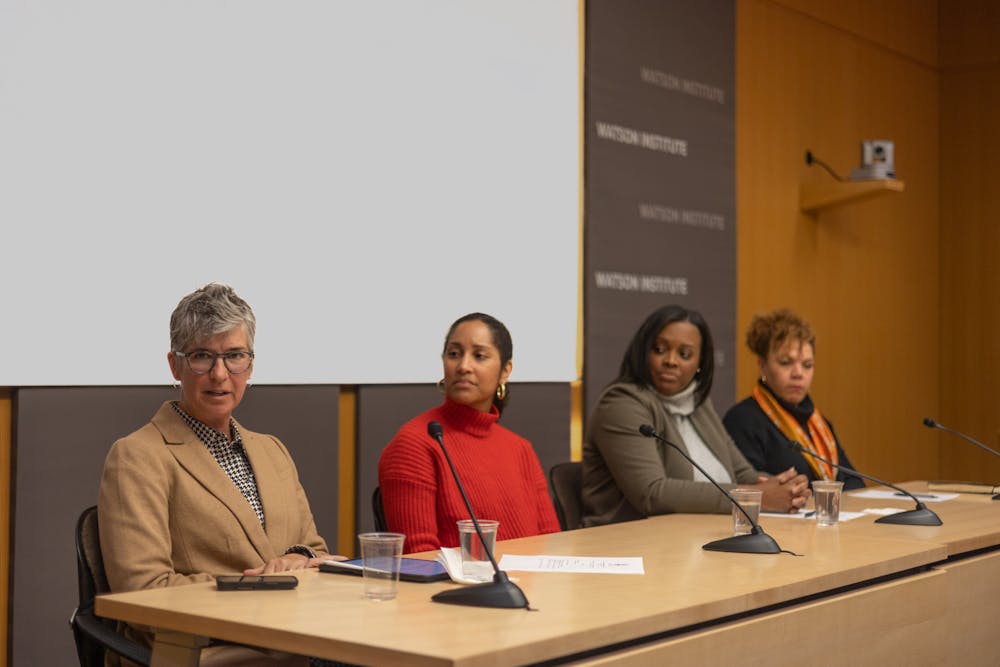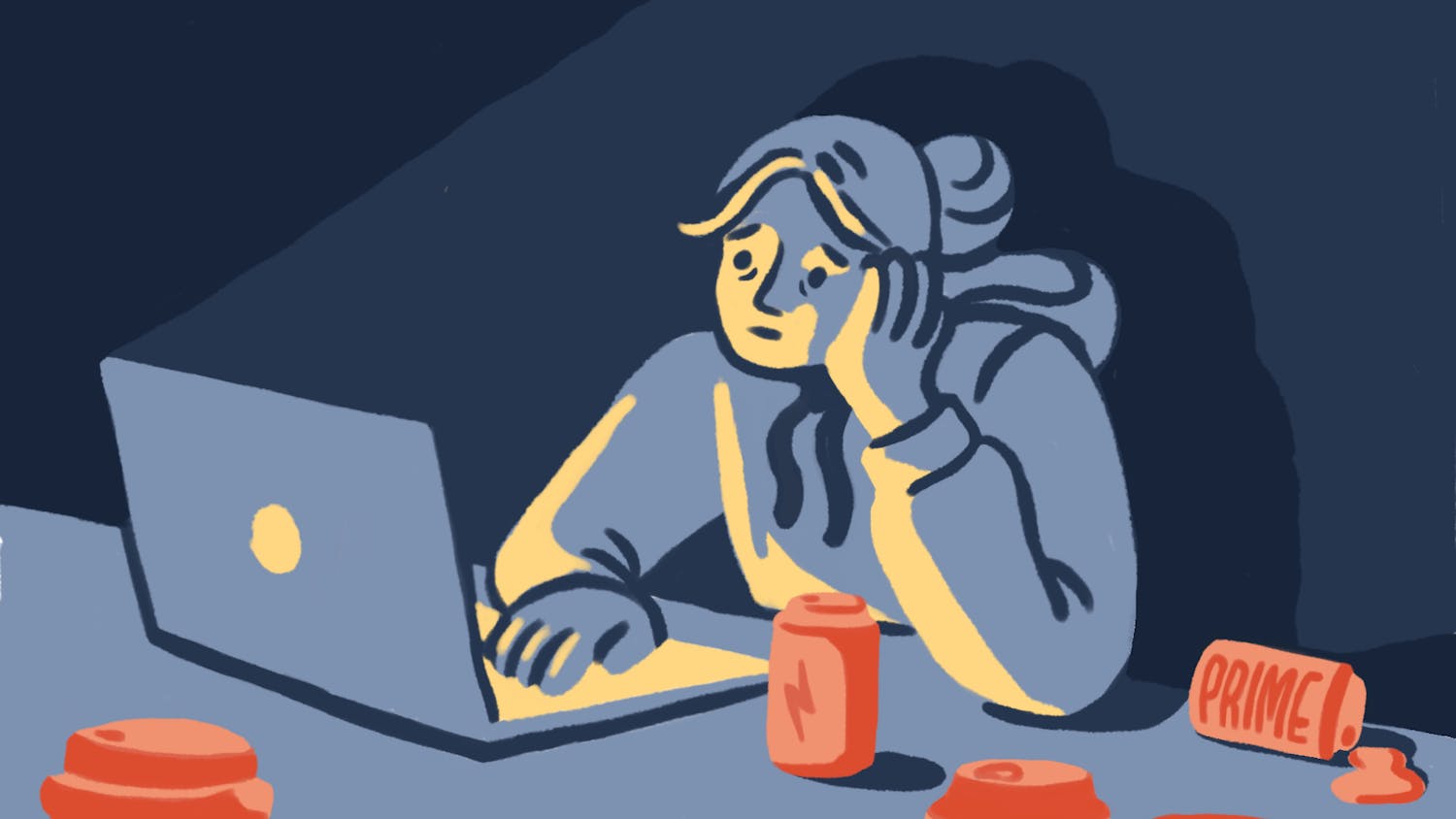The Brown University Community Council held its first meeting of the semester in the Watson Institute’s Joukowsky Forum Monday afternoon. The 37-person council, composed of University administrators, faculty, students, alumni and community members, “serves as a university-wide representative forum for discussion, debate and advisory recommendations on a wide spectrum of issues and concerns,” according to the council’s website.
President Christina Paxson P ’19 P’MD’20, the council’s chair, opened the meeting by explaining that the council's theme at the meeting would be “community engagement and community relations.” She also announced the appointment of various new members to the council, including several undergraduate representatives.
Paxson said that, as of now, one of her main priorities is the “increasing political attention” on higher education, citing the upcoming Supreme Court ruling on affirmative action. She noted that the University aims to have all of its “admissions work for this year done” before the ruling is announced.
She also expressed concerns about laws restricting the teaching of allegedly “divisive concepts” — many regulating the teaching of race and racism. While Paxson noted that those laws tend to impact public institutions of higher education and “can’t really regulate private institutions,” she emphasized the importance of preventing the laws from “creep(ing) up to the national level.”
“The students who are in these states K-12 are going to be the students who we help to recruit to Brown,” she added.
“We do have a big stake in what happens in these states even if they don’t directly affect us now,” Paxson said. “I think the politicization of higher education is going to become more pronounced over time.”
Paxson also shared updates about various University initiatives, including a new integrated life sciences building, the near-complete construction of new residence halls on Brook Street, research growth, the recent approval of a Data Science Institute, transforming CareerLab to be “less transactional” and progress on beginning a new college access program for students in Providence Public Schools.
She additionally discussed the University’s negotiations with Providence for new memorandums of understanding with the city surrounding payments in lieu of taxes.
Currently, the University is “talking to Mayor (Brett) Smiley and his team about what the next set of agreements looks like,” but those conversations are in “early stages.” Paxson declined to share any details regarding the conversations.
She additionally highlighted the upcoming celebration of the Center for the Study of Slavery and Justice’s 10th anniversary March 30 and the dedication weekend for the Lindemann Performing Arts Center Oct. 19 - Oct. 21, which will be a “weekend dedicated to highlighting the arts at Brown.”
Following Paxson’s report, the council heard from a group of University officials on Brown’s community engagement efforts. Officials were asked about examples of effective community engagement in their domains, how the University currently engages community members and areas for growth in the University’s engagement with the community.
Mary Jo Callan, vice president for community engagement and executive director of the Swearer Center for Public Service, said that the University must prioritize “reliability, predictability and sustainability in our community relationships.”
Joi-Danielle Whitehead, the director of diversity, equity, inclusion and access for Brown’s pre-college and summer undergraduate programs, emphasized the importance of engaging with Providence high school students in person. She informed the council that Providence Public School District students admitted into the University’s pre-college programs will all receive full scholarships.
“The best way to prepare for college is to go to college,” she said.
Patricia Poitevien, senior associate dean of diversity, equity and inclusion for the Warren Alpert Medical School, told the council that she is focused on “how we create more inclusive environments for our learners, our faculty, our staff and for our patients.”
Poitevien also shared updates on the new SMART Clinic program funded by the Warren Alpert Foundation to develop “school-based health clinics” that integrate “pediatric care into the schools … in an environment (students and their families) trust.” The SMART Clinic program opened at Calcutt Middle School in Central Falls in August 2022, and the next clinic is expected to open at Central Falls High School.
Calcutt’s program also includes the inaugural SMART Plus program, a “professional pathways initiative … designed to spark student interest in health and medicine careers,” according to a University press release.
Kelly Clifton, the University’s head of library community engagement, described ongoing work to develop the Center for Library Exploration and Research, a program which she said aims to “level the field for all incoming freshmen at Brown so they know they have partners at the library.” Clifton added that the library is working to connect its resources with the local K-12 community.
“At the library we have access to books, resources and subject expertise … but we’re not experts by any means,” said Clifton. “We have a lot to learn from our teachers, our students.”
Audience members at the event also asked questions to the panel. Questions surrounded how the University navigates distrust from the community, and if the University plans to further acknowledge its alleged failure to adequately consult the Narragansett Indian Tribe regarding human remains and funerary objects held by the Haffenreffer Museum of Anthropology.
Callan noted that when the University causes harm, it is crucial to acknowledge that harm as well as its “positionality.”
Community members “want to understand why they should trust you,” Whitehead said.
BUCC plans to hold its remaining panels this semester on March 15 and April 12, with the next panel focusing on “relations on College Hill,” according to Paxson.
Indigo Mudbhary is a University news senior staff writer covering student government. In her free time, she enjoys running around Providence and finding new routes.





